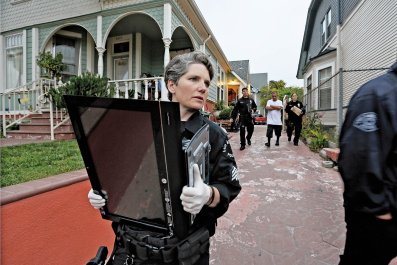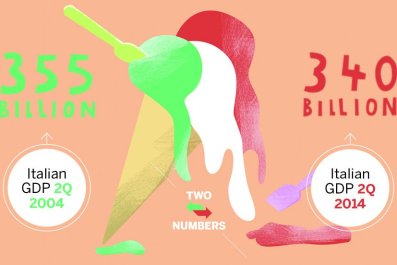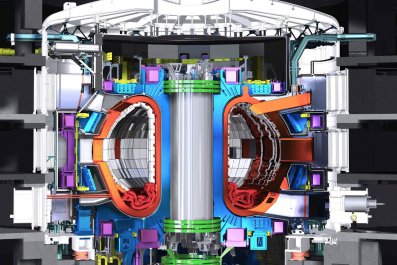The independence movement in Scotland and elsewhere seems to be on to something about our hyper-networked age: Scale ain't what it used to be. Technology can make a small country every bit as fruitful and globally competitive as any big one.
You go back to people like Caesar, Attila the Hun, Thomas Jefferson and his Manifest Destiny, and Josef Stalin and his Eastern Bloc, and everybody's playbook said strength, security and economic prowess were tied to size. Conquering your way to a more expansive nation-state was a great way to gather resources and vertically integrate to competitively make the stuff that was necessary in a given age—pyramids, petro-industrial complexes, nuclear arsenals.
But technology is neutering the power of scale in business—and nations will likely follow.
Back in the 20th century, it was generally cheaper and easier for a corporation to vertically integrate and do almost everything in-house, like make all the parts for an SUV or maintain a bureaucracy to address every aspect of corporate life. Economist Ronald Coase's Nobel-winning 1937 theory of the firm argued that corporations exist to lower transaction costs, so it costs less to get an in-house guy to do something, compared with the difficulty of finding and paying an outside guy.
If transaction costs were lower in-house, then a corporation was at an advantage if it could do more stuff in-house. That drove companies to get ever bigger. Fast-forward and you wind up with elephants like Exxon Mobil, with its $420 billion in annual revenue.
Today, super-cheap, ubiquitous global networks and software are turning corporations inside out. Technology is demolishing transaction costs. It's becoming pricier to employ an inside guy full time, give him health benefits and pay rent on an office than it is to find and get the best outside guy—who probably is better than your inside guy anyway.
This is why we see mushrooming phenomena like unscaling, the free-agent nation and micro-entrepreneurship. Platforms like Kickstarter, Curious, Shapeways, Elance and Etsy give tiny entities and the self-employed financial leverage and access to global markets. Scale isn't the advantage it used to be in business. In fact, size can turn into a burden. It's hard to move fast while lugging around legacy operations and a ton of built-up bureaucratic sludge.
Now, if technology and the whole transaction cost thing are empowering small entities in business, the same will no doubt be true for nations. Economically, if you're a small country you can already tap into networks and software to play on the global stage as effectively as any big country. And like a small company, a small country can mobilize to react to fast-changing markets much faster than a big entity can.
How about the challenges breakaway nations face? The Republika Sprska wants to break out of Bosnia and Herzegovina. It would have to create its own currency, tax system, laws, air traffic control and all that stuff nations do. But that would be easier now than ever. "Is there a way for states to outsource traditional state activities and still be effective as a state?" asks Michael Auslin of the American Enterprise Institute, a think tank. The closest we've got to a platform for countries is the European Union. In the EU, Auslin says, "some traditional nation-state activities get outsourced to Brussels."
In business, platforms have been a key to unscaling. A small dealer in antique neti pots (apparently once called "nasal douches," which just wouldn't fly today) can set up on Etsy and avoid replicating every aspect of a company. Etsy takes care of transactions, customer care, etc. A shift to smaller countries would take off if someone invents a platform like an Etsy or Airbnb for breakaway nation-states.
Of course, the platform would have to have a cute tech name—like Politicy. Or, for a military platform, Airmy.
War is a hurdle here. Military power seems tough to outsource, although there's always been a booming market for mercenaries. "If peace were to be taken for granted, unscaling for nations would make a lot of sense," says Hemant Teneja, a tech investor and unscaling proponent. Sadly, though, we won't be taking peace for granted anytime soon, given the list of ongoing wars.
But all in all, going small as a nation is making more sense. Smaller, tighter-knit groups can govern themselves better than a large agglomeration of groups that have competing needs. Emotional forces also pull for smaller nations. "Where people feel a sense of connectedness and willingness to sacrifice, that's how you really get allegiance to a national cause," Auslin says.
If emotions and political forces pull toward going small, and the economic advantages of being big are going away because of technology, and your proto-nation doesn't seem to need the protection of a large standing military—well, then, it's time for a divorce.
Ukraine is more likely to be successful as a tight-knit, nimble nation, outsourcing what it can to the EU, than as a bolt-on to Russia. Look how well Estonia has done by breaking with Russia, embracing technology, inventing Skype and jumping on the EU platform. Earlier this year, the Heritage Foundation ranked Estonia as the 11th best economy in the world. The country has about the same population as Dallas.
Scotland is closer than ever to breaking off its 307-year union with England. The Scots will decide in a September referendum. Polls show about 39 percent voting yes to the breakup, 51 percent no and the rest undecided. When Scottish politicians discuss Scotland's independent economic future, they still wrap it around North Sea oil. But the fact is that networks and software make an independent Scotland more viable than any time in history.
The unscaling trend would put Russian President Vladimir Putin and his land grabs on the wrong side of history. In business today, if you see two corporations mega-merging, it's probably because they're stuck in a scale-dependent old business model while multitudes of small digital entities come at them like angry bees. See: the proposed $45 billion Comcast-Time Warner Cable merger.
Russia is looking like Comcast in an age of YouTube. If Putin wants power, he really ought to build a platform, not an empire.






























